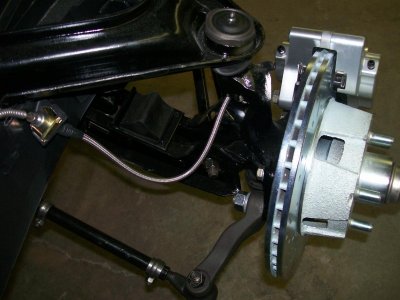more brake rotor info
I came across some info while online today so I thought I'd share it with all of you. It clarifies the differences in flat vs vented vs cross drilled rotors with pros and cons of each.
This clarifies a little of what I posted before about the cross drilled rotors, but I stand corrected on the heat dissipation reasoning. This article claims the effect of the surface area for flat vs cross-drilled is negligible, but also states that cross drilled holes can eventually develop microcracks. Based on what I'm reading here, I think overall I prefer vented rotors. They give some heat and gas dissipation, a bit better friction against the pads, but shouldn't have as short of a life as the cross drilled rotors.
http://www.carbibles.com/brake_bible.html
Rotor technology.
If a brake rotor was a single cast chunk of steel, it would have terrible heat dissipation properties and leave nowhere for the vapourised gas to go. Because of this, brake rotors are typically modified with all manner of extra design features to help them cool down as quickly as possible as well as dissapate any gas from between the pads and rotors. The following diagram shows some examples of rotor types with the various modification that can be done to them to help them create more friction, disperse more heat more quickly, and ventilate gas. From left to right.
Different styles of disc brake rotor
1: Basic brake rotor. 2: Grooved rotor - the grooves give more bite and thus more friction as they pass between the brake pads They also allow gas to vent from between the pads and the rotor. 3: Grooved, drilled rotor - the drilled holes again give more bite, but also allow air currents (eddies) to blow through the brake disc to assist cooling and ventilating gas. 4: Dual ventilated rotors - same as before but now with two rotors instead of one, and with vanes in between them to generate a vortex which will cool the rotors even further whilst trying to actually 'suck' any gas away from the pads.
An important note about drilled rotors: Drilled rotors are typically only found (and to be used on) race cars. The drilling weakens the rotors and typically results in microfractures to the rotor. On race cars this isn't a problem - the brakes are changed after each race or weekend. But on a road car, this can eventually lead to brake rotor failure - not what you want. I only mention this because of a lot of performance suppliers will supply you with drilled rotors for street cars without mentioning this little fact.
Big rotors.
You know I've been drumming into you the whole mechanism that causes you to stop? How does it apply to bigger brake rotors; a common sports car upgrade? Well sports cars and race bikes typically have much bigger discs or rotors than your average family saloon car. The reason again is to do with heat and friction. A bigger rotor has more material in it so it can absorb more heat. More material also means a larger surface area, which as well as meaning more area for the pads to generate friction with, also translates to better heat dissipation. On top of that, the larger rotors mean that the brake pads make contact further away from the axle of rotation. This provides a larger mechanical advantage to resist the turning of the rotor itself. To best illustrate how this works, imagine a spinning steel disc on an axle in front of you. If you clamped your thumbs either side of the disc close to the middle, your thumbs would heat up very quickly and you'd need to push pretty hard to generate the friction required to slow the disc down. Now imagine doing the same thing but clamping your thumbs together close to the outer rim of the disc. The disc will stop spinning much more quickly and your thumbs won't get as hot. That, in a nutshell explains the whole principle behind why bigger rotors = better stopping power.
Taking it one step further, composite brake rotors, as found on high-end Ferraris, the McLaren F1, and most F1 race cars, are even better again at heat transfer.

















